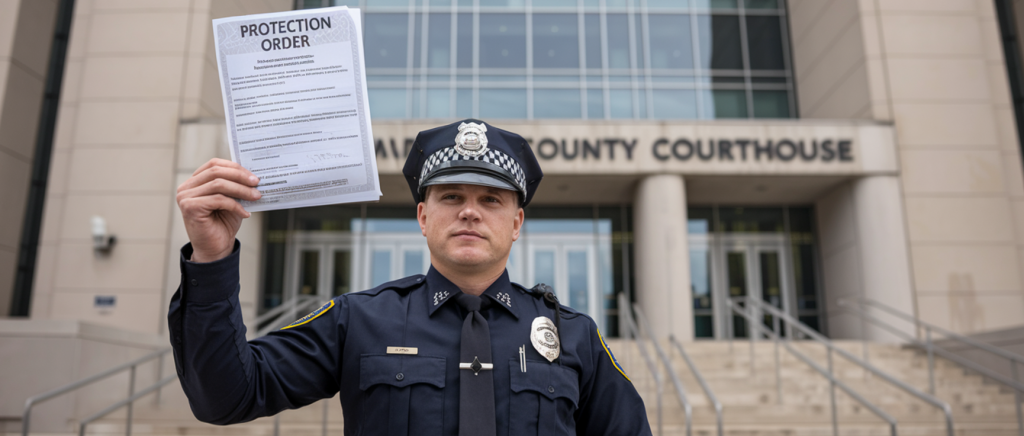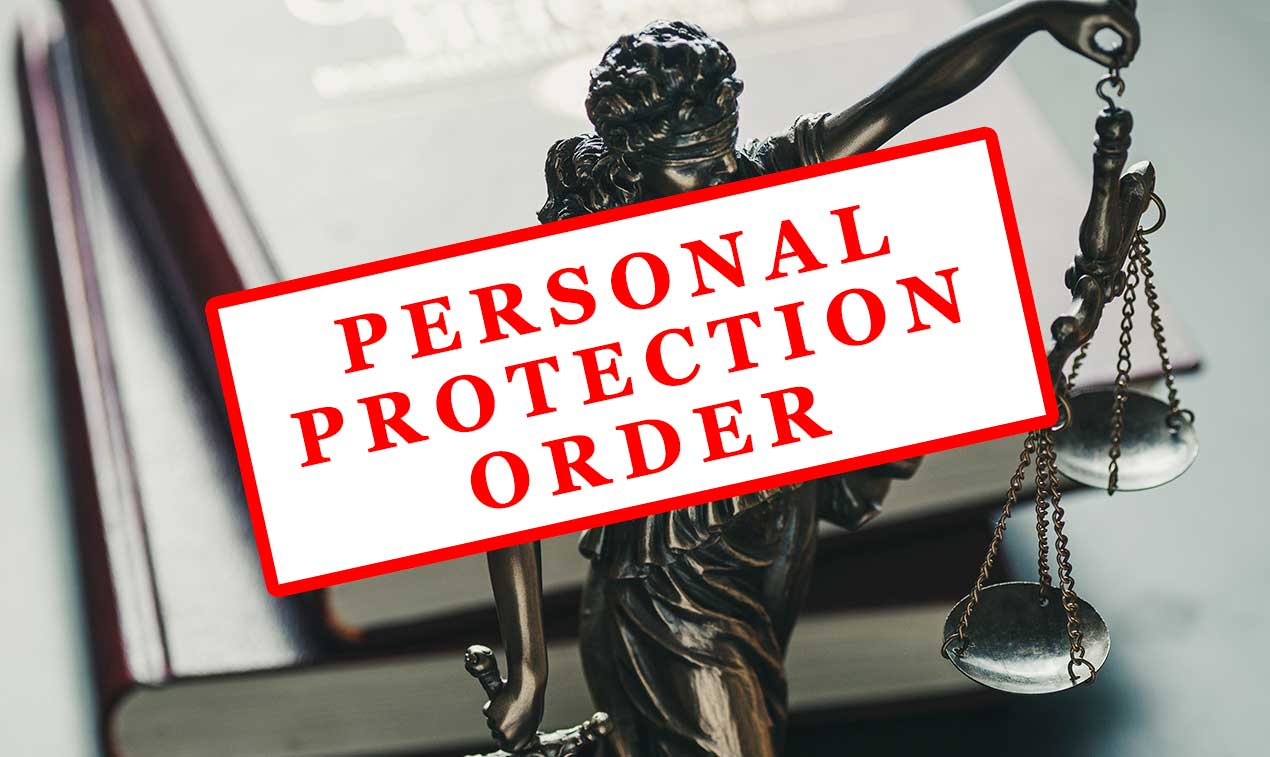How To Deal with a Personal Protection Order
A PPO can turn someone’s life upside down. Some petitioners use these restraining orders as a weapon to harass and intimidate a person for revenge, control, or other nefarious reasons.

Personal Protection Order Attorneys
The attorneys at LEWIS & DICKSTEIN, P.L.L.C. are often called upon to help people with personal protection orders (PPOs) entered against them. Some people call these court orders “restraining orders.” PPOs are court-issued orders compelling a person not to threaten, harm, harass, intimidate, or have contact with another person. The severe ramifications for someone who is the subject of a PPO, including jail time, are little known among the public, but they can haunt someone for the rest of their life.
What is a PPO?
A personal protection order (PPO) is a court order to stop threats or violence made by one person against another. They are intended to protect people from threats, harm, or harassment from someone who has been warned to stop offensive behavior but has failed to do so. A judge will grant a PPO if a petitioner convinces a court that they have a reasonable fear for their safety. A judge can issue a PPO without a hearing. A PPO granted without a hearing is called ex parte. Conversely, a judge may require a hearing to determine if a PPO is justified. It is in the best interest of a threatened or harassed person to obtain a personal protection order immediately.
Two Types of PPOs are Domestic and Non-Domestic
A Domestic Personal Protection Order is appropriate when there is a familial, domestic, or romantic relationship between the petitioner and the respondent (also known as the defendant). A domestic relationship is broadly defined and can include blood relatives, relatives by marriage, or people who have lived together (like roommates). A Non-Domestic PPO would get filed when someone is allegedly assaulted, harassed, or stalked by an acquaintance, coworker, former friend, or stranger.
In a PPO case, the plaintiff is called a “petitioner,” and the defendant is called the “respondent.” Even though the allegations in a PPO petition may include references to criminal activity, respondents are not defendants. Many PPOs are the result of false or exaggerated allegations made by petitioners.
“What should I do if a PPO is filed against me?”
If a PPO has been requested or granted against you, time is of the essence. Once the court grants a PPO, you have only 14 days to take action from when you are served or have actual notice of the order, whichever comes first. Within those 14 days, you must file a Motion to Terminate. If you do not act within 14 days, the PPO will stay in effect, and you will not have a right to a hearing to dispute the accusations. Although you may not be able to seek a total dismissal of the PPO after 14 days, you can always file a motion to modify or terminate specific parts of the PPO.

“Why should I care about a PPO if I don’t want to have contact with that person?”
People commonly believe that Personal Protection Orders don’t make any difference if they are not interested in making contact. This belief is seriously flawed and can lead to disastrous consequences. A PPO is entered into the Law Enforcement Information Network (LEIN), meaning it is on your record. When someone searches the network for your name, the PPO may come up, suggesting you are dangerous. Additionally, private companies that maintain records for background searches keep and report records of personal protection orders to potential employers, licensing agencies, banks, and other interested parties.
If the petitioner comes to court and alleges a violation of the order, the respondent faces possible jail time. The burden of proof is substantially lower than in criminal matters. If the judge believes a respondent violated the PPO, they almost always impose jail time. The prosecution must demonstrate that a defendant committed a crime beyond a reasonable doubt. However, in PPO violations, the court will rule based on a “preponderance of the evidence,” meaning it will hear from both sides and decide which party presents the more persuasive evidence. The petitioner almost always gets the benefit of the doubt unless a strong, credible defense is mounted. Though “preponderance of the evidence” may sound fair, the chances of you being found guilty of a violation are higher than in a criminal case, and the amount of proof against you can be slim. If the petitioner makes accusations that you violated the PPO and the court finds you in contempt, you may be imprisoned for up to 93 days and fined up to $500. Once out, the petitioner could make the same accusations again, leading to jail time & fines as long as the PPO stands.
If your thought is that you know you are not worried about a violation because you will avoid contact, you may want to rethink your position. If the allegations in the petition for the Personal Protection Order were false or exaggerated, there is a reason to be concerned about false or exaggerated allegations of a violation. Moreover, contact interpreted as a violation may have been accidental. For example, inadvertently and innocently finding yourself in a movie, grocery store, park, or restaurant with the petitioner can result in an allegation of stalking or harassment, which would constitute a violation.
How to Dismiss a Personal Protection Order
After people file PPOs in court, they sometimes regret seeking a court order and realize there might have been a better way to handle their situation. A petitioner might realize they misunderstood a situation or blew it out of proportion. The main impediments to dismissing a PPO are judges and prosecutors who believe they know better than those intimately familiar with their situation. Shockingly, a Petitioner might find their Motion to Terminate PPO denied because a judge rules they need protection even when the parties know differently. It is always best to consult with an experienced PPO attorney before making any decisions that could result in an unwanted court ruling.

Frequently Asked Questions
How long does a PPO last in Michigan?
In most situations, personal protection orders in Michigan are good for six months or a year. If the petitioner feels they still need protection, they can request an extension before the order’s expiration.
How do I fight a PPO in Michigan?
You can ask the judge to amend the provisions of the PPO before it terminates (ends) or file a Motion to Terminate the PPO within 14 days of service. Although a lawyer is not required to terminate or modify a PPO, the odds of getting relief are greater with experienced counsel.
Can you look up a PPO in Michigan?
PPOs are public records recorded in the Law Enforcement Information Network (LEIN). However, you would have difficulty finding evidence of a Personal Protection Order online. According to the law, courts cannot make information about the registration of a PPO or filing a petition for a PPO available to the public on the Internet.
How long is a no-contact order good for in Michigan?
If the no-contact order is part of a PPO, it will likely last six months or one year. If the no-contact order is a condition of a defendant’s probation, it will last the entire time that person is on probation unless they file a motion to remove the no-contact provision. Finally, if the prohibition is according to a criminal defendant’s bond conditions, the order will last until the case’s conclusion, unless a judge decides otherwise.
How long does a PPO stay on your record in Michigan?
A PPO granted and entered into the Law Enforcement Information Network (LEIN) will remain on a person’s record until it is terminated or expires.
How do I get a PPO dropped in Michigan?
The petitioner can only drop or dismiss their PPO with a judge’s permission. If the petitioner is willing to dismiss the PPO, they can file a motion and request an order of dismissal. Judges are reluctant to dismiss PPOs, even if the petitioner makes the request, so it is best to have a lawyer draft the Motion to Dismiss PPO. If the petitioner is not volunteering to dismiss the PPO, the respondent can file a Motion to Terminate the PPO within 14 days of being served.
How long does it take to drop a PPO in Michigan?
In the best-case scenario, it can take a couple of weeks to file a motion, get a hearing, and obtain an order dismissing a PPO. In many cases, especially if the petitioner opposes termination of the Personal Protection Order, getting an order to drop the PPO can take several months.
Can a person violate their own protective order?
No, a person cannot violate their own Personal Protection Order. A restrained person is subject to a violation and incarceration, even if the PPO petitioner initiates contact or even begs for communication between the parties.
How do I obtain a form to terminate a PPO?
If you are going to represent yourself, you can obtain a Motion to Terminate PPO form by searching the Internet for forms and to be filed with the Circuit Court. If you decide to retain experienced private legal counsel, your lawyer will have the forms at their disposal and will likely file customized pleadings, giving you a greater chance of obtaining relief from the court.

You Need an Advocate with a Winning Track Record to Successfully Oppose a Personal Protection Order.
If someone has obtained or is trying to get a personal protection order against you, call one of the attorneys at LEWIS & DICKSTEIN, P.L.L.C. We have decades of experience dealing with personal protection orders in Wayne County, Oakland County, Macomb County, and throughout Michigan. If you believe someone has a PPO order against you, hiring a tenacious and effective attorney to fight the allegations against you is in your best interest. If you call us for a free consultation, we will take the time to talk with you, answer your questions, and address your concerns.
Call us today at (248) 263-6800 for a free consultation or complete an online Request for Assistance Form. We will contact you promptly and find a way to help you.












